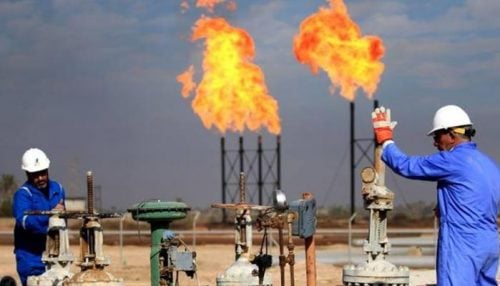Iraq is working to revive oil pipelines with Saudi Arabia, Jordan and Syria, after stopping the flow through Turkey led to a decline in Baghdad’s exports by about 500,000 barrels per day.
Baghdad is seeking to find permanent and alternative outlets for its oil exports, amid plans to increase production to 8 million barrels per day by 2027, according to data seen by the specialized energy platform.
Iraq owns a number of oil pipeline projects with neighboring Arab countries, which enables it to find new and alternative export outlets to the existing ones, through the port of Basra or the Ceyhan pipeline to Turkey.
Iraqi oil exports have declined by about 500,000 barrels per day since the end of March, after Turkey stopped exporting through the port of Ceyhan in the wake of an international ruling fining Ankara.
Revival of oil pipelines
The Iraqi prime minister’s advisor on foreign relations, Farhad Alaeddin, said that there are negotiations to revive the oil pipeline with Saudi Arabia, which existed in the seventies.
He added that there is consideration of activating an oil pipeline through Syria, in addition to the “Basra-Aqaba” pipeline, which is currently being studied by consultants, according to Bloomberg Al-Sharq.
Baghdad developed an integrated study for the oil pipeline project between Basra and Aqaba, after the current government examined the obstacles that accompanied – or led to – not proceeding with the project, which had a high cost, and it was re-examined again.
The Basra-Aqaba pipeline project aims to add a new port to oil exports with a capacity of one million barrels per day, in return for increasing exports from the southern port to 6 million barrels per day, according to what was seen by the specialized energy platform.
The port of Basra is the main outlet for Iraqi exports. It controls most of the crude oil exported from the fields of central and southern Iraq, and its exports currently reach about 3 million barrels per day.
Oil exports through Türkiye
Baghdad’s plans to revive oil pipelines come after it suffered more than two months from stopping the export of Kurdistan’s oil through the Turkish port of Ceyhan. As a result, the region lost exports estimated at 450,000 barrels per day.
On the re-export of oil through the pipeline to the Turkish port of Ceyhan, Aladdin said that the Turkish side says that there are “technical problems” that impede the resumption of work.
He pointed out that the Turkish run-off elections may be preoccupying the interests of Turkish officials at the present time.
The export of about 450,000 barrels per day of crude oil from the Kurdistan region and the Kirkuk fields via a pipeline to the Turkish port of Ceyhan stopped last March, after Iraq won an international arbitration case due to Turkey allowing Erbil to export oil without the approval of Baghdad, as Baghdad is considered an export Oil by the territorial government is illegal.
The advisor to the prime minister said, “The Turkish side initially asked to negotiate a fine approved by the court, estimated at $1.5 billion, but they told us later that the process of stopping the oil through Ceyhan pipelines was due to technical problems.”
Gas exploitation
On the other hand, Aladdin said that his country seeks to fully exploit the gas associated with oil production operations, which currently ranges between 1,600 and 1,800 million cubic feet per day of gas.

On Tuesday, on the sidelines of the Qatar Economic Forum, Iraqi Oil Minister Hayan Abdul Ghani confirmed that his country has a partnership with Shell to exploit associated gas from oil production in Basra.
He added that the opening of the first phase of exploitation of about 400 million cubic feet per day of associated gas will be at the end of this month, and the second phase will open at the end of the year.
There is also a partnership with the French company “Total” to exploit the equivalent of 600 million cubic feet per day of gas over 5 years.
Adviser to the Prime Minister, Mazhar Muhammad Salih, confirmed in recent statements that his country’s losses due to non-stop flaring and gas imports are estimated at about $12 billion annually.
The Iraqi Ministry of Oil aims to stop flaring gas by 2027 as part of efforts to reduce emissions resulting from oil extraction, and to secure the country’s needs for fuel needed to operate power plants.
related topics..
Also read..

Leave a Reply